Into 2026, gender remains one of the most defining issues in entrepreneurship that shapes the global business landscape.
Women launch startups at record rates, driven by innovation in every industry, from digital services to sustainability, but capture only a small fraction of venture capital funding. In spite of momentum, systemic bias continues to shadow women founders in securing investment or scaling their ventures.
High-growth fields like technology and fintech remain dominated by men, but the narrative is turning around. Across the world, women entrepreneurs are breaking through, using AI tools, remote work, and digital platforms to build companies on their terms.
So, does gender still matter in entrepreneurship in the year 2026? Absolutely, but not always in the ways you might think.
The business environment is changing, providing fresh opportunities and the same old challenges. We can also discuss the state of female entrepreneurship nowadays and the implications of these trends on the future of inclusive businesses.
The Status of Women's Entrepreneurship
The landscape of women's entrepreneurship is continuously changing, but fundamental challenges remain resiliently present. According to recent data, although women are increasingly becoming business owners at record numbers never seen before, especially in tech and digital industries, they still face important barriers that their male counterparts rarely experience.
Statistics paint a more nuanced picture: women-led startups still secure less than 3% of global venture capital funding, and women hold just about 10% of CEO roles across the Fortune 500. Yet progress is undeniable: gender-lens investing policies are expanding across more markets, accelerator programs designed for women founders continue to grow in number, and conversations around inclusive leadership and work–life balance have firmly entered mainstream business discourse.
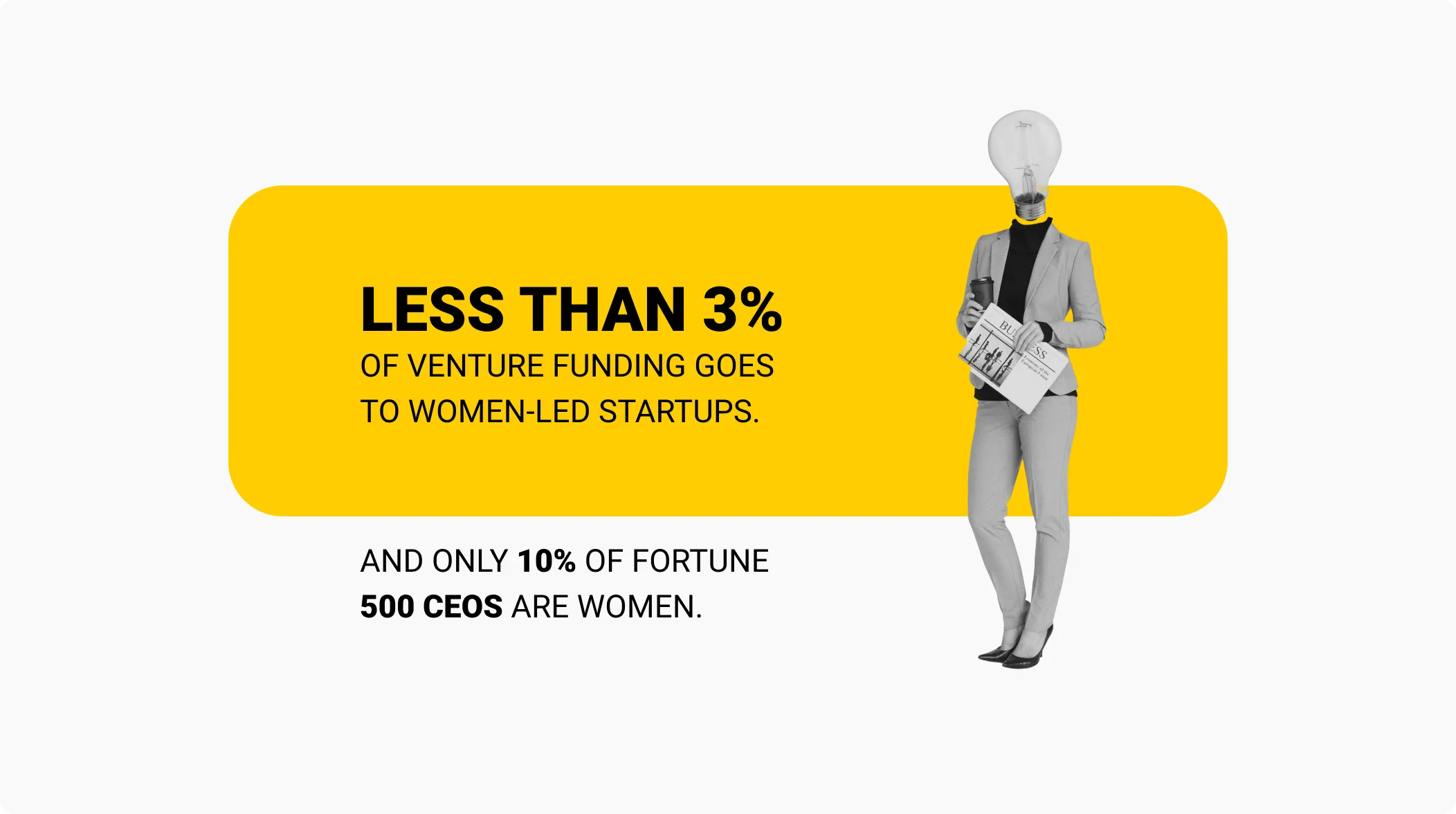
Why does the gender gap persist? The answer is multifaceted. Women still shoulder disproportionate caregiving responsibilities, putting in significantly more time into household duties than their male peers. That reality affects when and how women can pursue entrepreneurship. Added to that are systemic biases in funding decisions, limited access to networks, and "pattern-matching" tendencies by investors that continue to put women founders, let alone women of color, at a disadvantage.
But 2026 ushers in fresh momentum: AI tools democratize access to business resources, remote work reshapes entrepreneurial possibility, and a new generation of women refuses to accept the status quo. Let's explore what the latest data says about where we are today.
Current Snapshot: Where We Stand in 2026
Let's cut through the noise and look at what the data actually tells us about women's entrepreneurship today. The numbers show a story of incremental progress, persistent obstacles, and pockets of genuine transformation. Understanding where we stand requires a look beyond headlines at the realities on the ground.
Startup Rates: Closing the Gap, Slowly
As reported by the Global Entrepreneurship Monitor (GEM), the start-up activity of women throughout the world is marked by approximately 10.4 percent in 2021-2023 in comparison with 6.1 percent in 2001-2005. The number of women establishing new businesses in the U.S. is drastically high in 2024 since they established 49% of all of the new businesses, compared to before the pandemic, when they made up less than a third of new founders. Female entrepreneurial activity rates vary widely across Europe and other OECD economies: several high-income countries approach parity, while many Southern and Eastern European countries report lower levels of women's business creation.
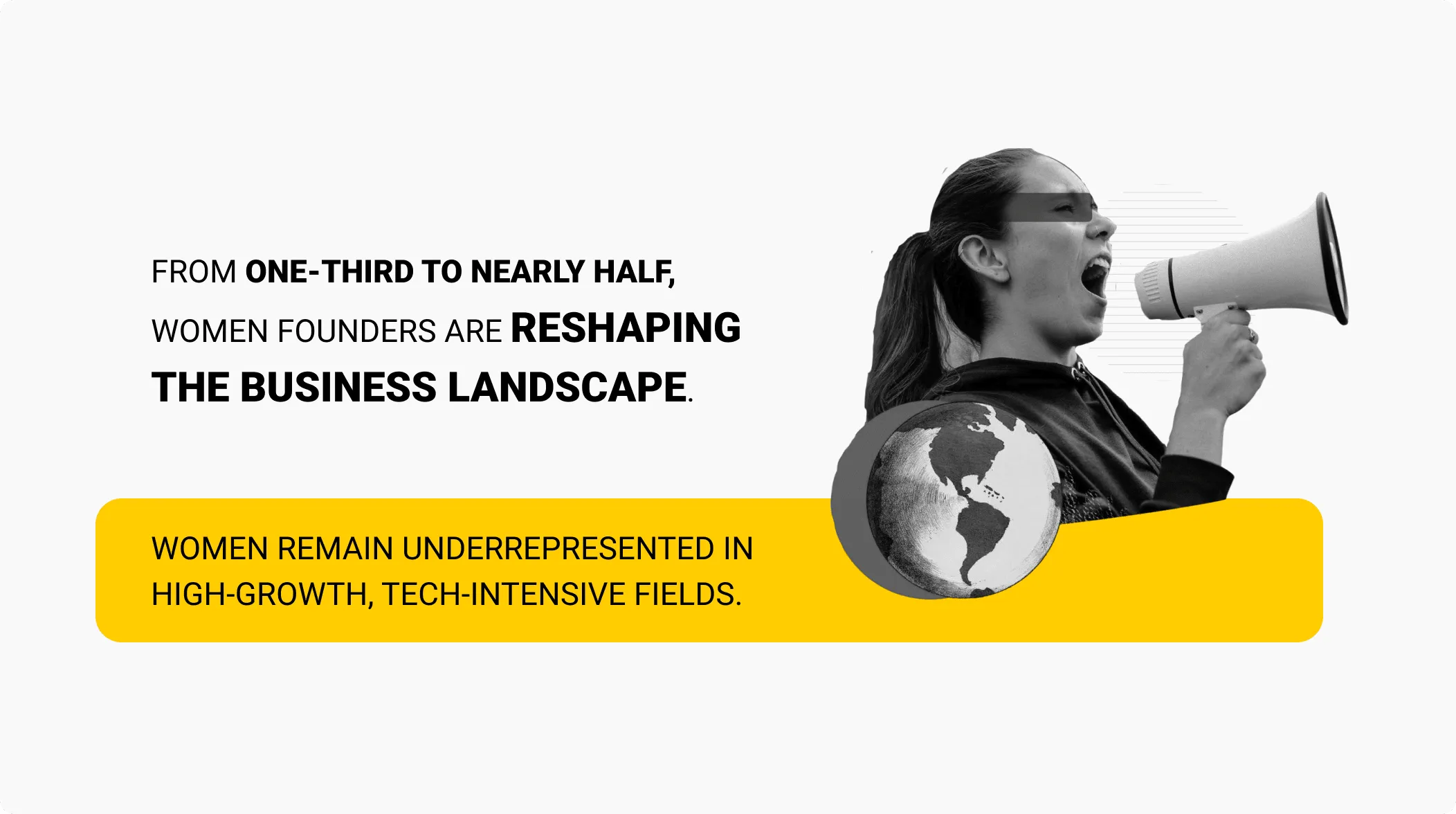
The Funding Crisis Continues
Women-only startups attracted approximately 2.3 percent of venture-capital funding in all parts of the world in 2024, as per the estimates of 2025. The same is the case even in both Europe and the U.S.: founding teams comprising all women raised less than 2% of total VC financing in the most recent analyses. Even when women founders do secure investment, their average deal size remains markedly smaller-typically more than 50% below that of male-only teams.
High-Growth Sectors: Still Playing Catch-Up
Analyses by the OECD and others still indicate underrepresentation of women in high-growth, tech-intensive fields: in deep tech, fewer than 25% of startups are founded by at least one woman. In fintech, while women-founded companies have become one of the most-funded sectors for female founders, their overall share of sector funding remains small. In biotech, leadership representation is also still limited; female CEOs were at about 18% in recent industry tallies, underscoring a thin pipeline from founding to the C-suite. Manufacturing and other deep-tech–adjacent areas also remain male-dominated, with longstanding entry and financing gaps for women founders.
Bright Spots Worth Celebrating
“It’s not all discouraging. More recent studies indicate that gender-lens investing is becoming increasingly popular: in a 2024 survey, 27% of impact-investor companies said that 30% or more of their assets were invested in women-owned or women-led investees. In the meantime, policy assistance is growing: women entrepreneurs are now addressed by national programmes in the form of special grants by tax benefits, or mentorship. Nevertheless, the exact figures of suc
h programmes in the whole world are not numerous.
The data tells us we're moving forward, just not fast enough. But these statistics also reveal where momentum is building and which interventions are actually working. The question now becomes: how do we accelerate the progress and scale what's succeeding?
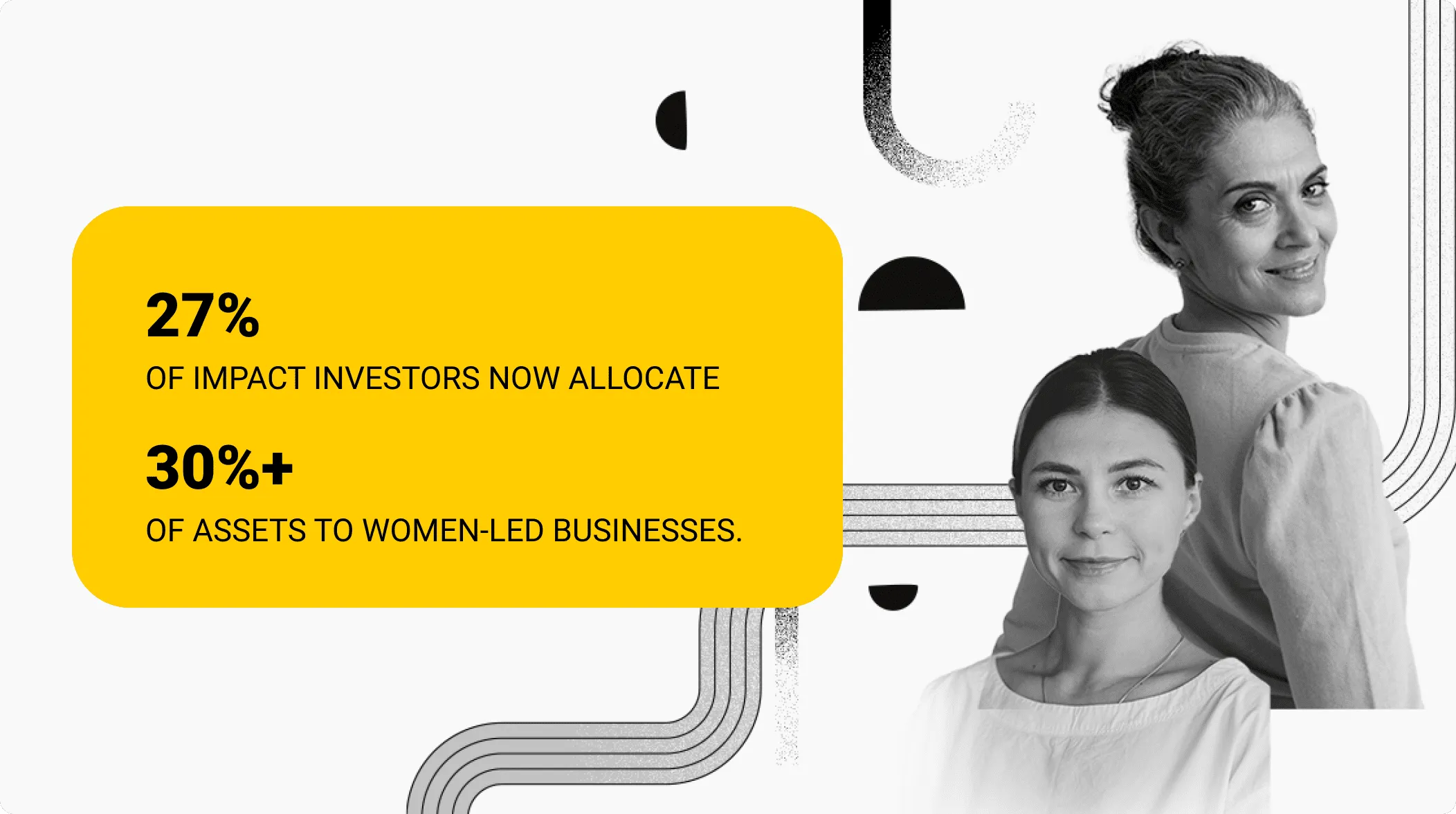
Why Are Women Underrepresented in Entrepreneurship?
The entrepreneurial gender gap is not the result of any single barrier but is instead an intricate series of interconnected factors throughout a woman's career path that start early and persist.
Traditional Barriers That Won't Budge
The fundamentals haven't changed as much as we'd like to believe:
- Caregiving responsibilities: Women still bear the majority of childcare and eldercare responsibilities, leaving less time and mental bandwidth for the demanding early stages of building a business.
- Social expectations and stereotypes: Society continues to promote men as "natural" risk-takers and leaders, while sanctioning females for those same ambitious behaviors that get praise from males.
- Network access: Entrepreneurship is about connections, and women are underrepresented in the informal networks, golf courses, and boardrooms where deals are actually struck.
New-Age Obstacles in a Digital World
Technology was supposed to be the great equalizer. Instead, it has introduced fresh challenges:
- The digital skills gap: Less access to higher technological training and coding education in advanced areas, specifically for women in developing regions, results in fewer opportunities to start technology-enabled ventures.
- AI and algorithmic bias: Lending algorithms trained on historical data often perpetuate past discrimination, making it harder for women to secure loans. In the same vein, AI-powered hiring tools and investor matching platforms can also reinforce the existing gender biases.
- Technology industry culture: The male-dominated venture capital firms, startup accelerators, and the entire technology ecosystem seem to base their investment decisions on "pattern matching," where they invest in founders that resemble previously successful ones-in other words, mainly white men.
The Education Foundation
Real change can happen here: education. We need comprehensive entrepreneurship programs that reach girls early, showing them that founding a business is not only possible but expected. Boys need this education too, to normalize women's leadership and break stereotypes before they calcify. Currently, entrepreneurship education remains inconsistent and often skews toward traditionally male domains.
It has to be clear from the message that women belong in entrepreneurship as the norm rather than the norm. When we combine early education with systemic reforms that address old and new barriers, we create pathways, not obstacles.
The Challenges Women Entrepreneurs Still Face
This understanding of why women remain underrepresented requires examination into the specific obstacles at every stage that block their path. Some barriers have been long-standing; others have evolved with our digital economy.
Access to Finance: The 2% Problem
Let's talk about the elephant in the room: money. Recent data show that startups founded exclusively by women receive only about 2% of all venture-capital funding around the world. Even when they get investment, their average funding round remains significantly smaller compared to male-led ventures-for example, one report from 2025 reflects an average deal size for female-only founded companies at US$5.2 million compared to US$11.7 million for male-only founded companies.

Why does this happen? Investor bias, at least in part. Research has shown that investors tend to ask male founders promotion-focused questions ("How will you scale this?") while asking female founders prevention-focused questions ("How will you prevent losses?"). These seemingly innocuous differences make all the difference in funding outcomes.
The bright side? More and more, gender-lens investing is gaining real traction. VC funds that focus on female founders are growing, such as Female Founders Fund and Backstage Capital. Crowdfunding has democratized access to capital, with women actually outperforming men on platforms like Kickstarter. And studies consistently show that women-led startups deliver higher revenue per dollar invested.
Networks and Mentorship: Breaking Into the Boys' Club
Entrepreneurship runs on relationships, and this is where women face a structural disadvantage. The "old boys' network" excludes women from crucial introductions, insider knowledge, and partnership opportunities.
Historically, women have lacked access to:
- Informal networking spaces where deals happen (golf clubs, exclusive dinners, alumni networks)
- Senior mentors who can open doors and vouch for their credibility
- Peer networks of fellow entrepreneurs facing similar challenges
What's changing in 2025-26? Online platforms are threatening old forms of hierarchies. Connections are now more accessible through LinkedIn, industry-specific Slack communities, and virtual accelerators. Women-focused organizations like SheEO, Female Founders Alliance, and Chief are creating powerful alternative networks. Women-only accelerators Y Combinator's Female Founders Track, Cartier Women's Initiative, and Springboard Enterprises are proving that intentional community-building works.
Confidence, Experience, and the Start-up vs Scale-up Gap
This is a painful fact: women usually begin the business with less experience in the industry and less confidence than their male counterparts. However, this is not the issue of an inherent difference; it is an issue of socialization and opportunity.
Women are more likely to:
- Question their preparedness to go off until they are thoroughly prepared.
- Underestimate their skills and accomplishments (the confidence gap)
- Start as solo entrepreneurs rather than assembling co-founding teams
- Launch necessity-based businesses rather than high-growth ventures
The scale-up gap is particularly stark. Women successfully launch businesses at increasing rates, but struggle to grow them past the small business stage due to limited access to growth capital, smaller networks, and fewer mentors.
Progress is happening. Leadership training programs like Goldman Sachs 10,000 Women and Stanford's Women's Leadership Lab are building confidence through education and community. Media coverage of successful women founders from Whitney Wolfe Herd (Bumble) to Melanie Perkins (Canva) creates visible proof that women can build unicorns.
Caregiving and Work-Life Balance: The Invisible Workload
Let's address the reality that still defines many women's lives: caregiving responsibilities. Women spend, on average, 2-3 more hours per day on unpaid domestic work than men. When you're managing children, aging parents, and a household, finding time to build a business becomes exponentially harder.
This burden affects:
- When women can start businesses (often later in life, after children are older)
- What types of businesses they choose (flexible lifestyle businesses vs. high-growth ventures)
- Their ability to network, travel for meetings, or attend evening events where deals happen
But the landscape is shifting. The post-COVID normalization of remote and hybrid work has created new possibilities. Women are leveraging digital business models that don't require physical presence, remote team management, and flexible e-commerce ventures that fit around caregiving schedules.
Technology makes asynchronous entrepreneurship possible in a manner that was impossible a decade ago. Discussions on work-life integration are becoming the norm, and an increasing number of male couples are sharing household duties. There are also countries with strong parental leave and childcare programs that enable parents of both genders to be more entrepreneurial.
The takeaway: Caregiving is also a big issue, and new forms of business and cultural change are providing a way out that was previously unavailable.
What’s Changing: Emerging Trends and Opportunities
While barriers persist, the entrepreneurial landscape for women is evolving in meaningful ways. New technologies, sectors, and support systems are creating opportunities that didn't exist even five years ago.
Digital Entrepreneurship and Platforms
E-commerce sites such as Shopify and Etsy, freelancing sites such as Upwork and Fiverr, and creator economy software such as Substack have radically reduced barriers to entry. Women do not have to have large capital or retail outlets to start profitable enterprises. The platforms offer infrastructure, payment processing, and customer bases in a way never before democratized entrepreneurship. The result? Women are excelling in digital-first companies, specifically in creative service companies, consulting, and product-based companies.
High-Growth and Scale-Up Women-Led Businesses
Women aren't just starting businesses; they're scaling them. Companies like Glossier, Spanx, and Rent the Runway prove that women can create billion-dollar enterprises. In 2024, 14 new women-led unicorns emerged globally, a 134% increase from six in 2023. However, challenges remain: the average female-founded company in the late- or venture-growth stage was valued at $46.8 million in 2024, compared with the U.S. average of $67 million. Female-focused funds and dedicated growth capital are helping women make the journey from startup to scale-up, but we remain a long way from parity.
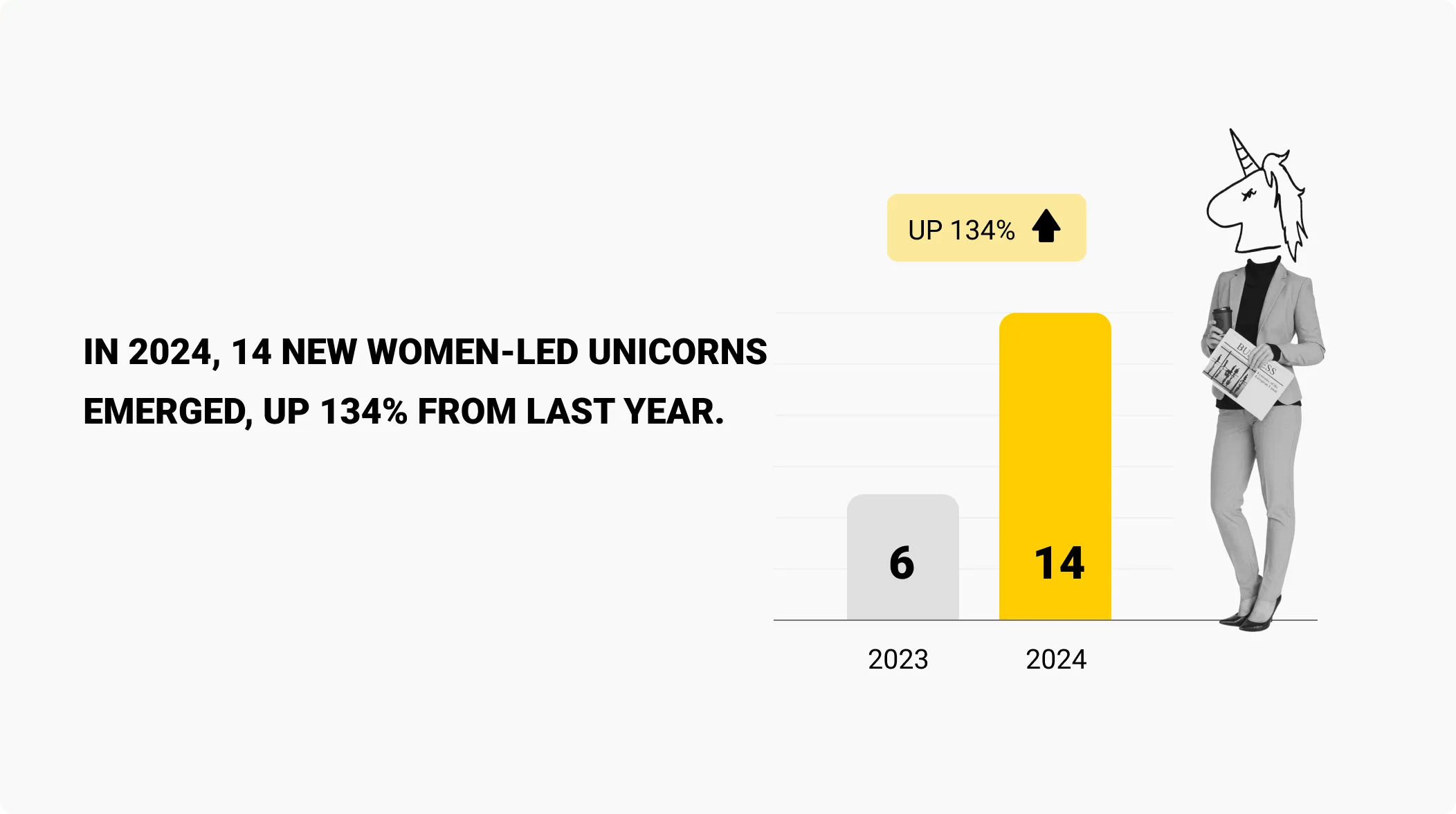
New Sectors: Green, Tech, and AI Entrepreneurship
Women are entering emerging sectors, though representation remains challenging. In climate tech, female-only founders captured just 5.3% of deals and 1.1% of total funding globally in the first nine months of 2024, while mixed-gender founding teams accounted for 21% of deals. In AI and machine learning, just under 20% of funding rounds in 2023 went to companies with at least one female founder, though 77% of female founders in Europe are now leveraging AI in their businesses. These sectors represent the future of high-growth entrepreneurship, and women's presence matters for both innovation and equity.
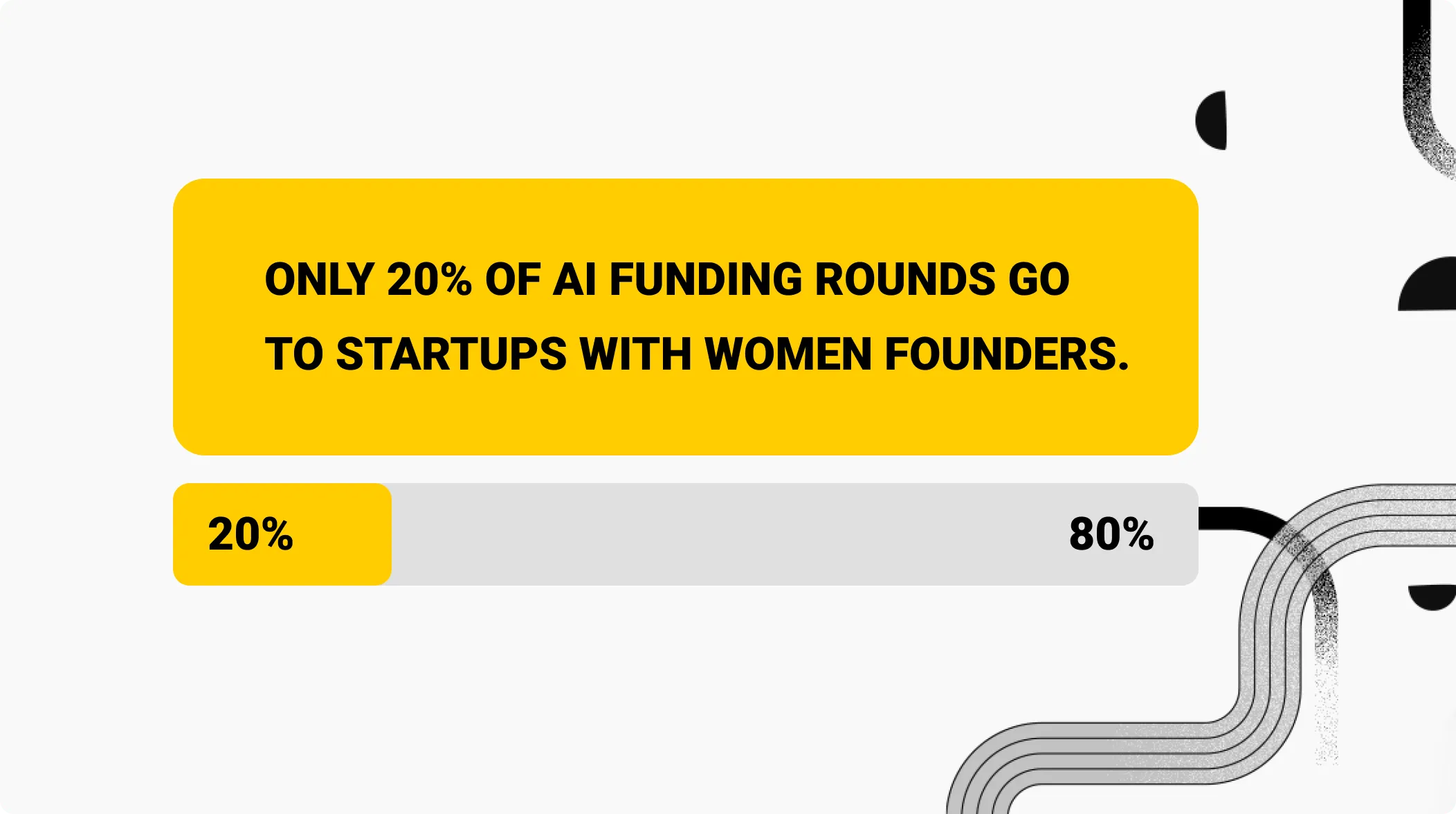
Intersectionality: Race, Age, and Migration
Not all women entrepreneurs face the same challenges. In the first half of 2024, Black-founded teams received just 0.3% of all VC funding, while Black and Latinx women founders combined received only 1% of all venture capital in 2022, a crisis within a crisis. In spite of the high levels of business ownership among immigrant women, they usually do not have access to networks and credit. Younger women (less than 30) are subject to credibility issues, whereas older women (more than 50) are confronted with the prejudice of age, regardless of their decades of experience. The solutions have to be intersectional, including the way race, ethnicity, immigration status, and age increase gender-based obstacles.
These emerging trends reveal both the expanding possibilities and the work still ahead. Technology is creating pathways, new sectors are opening doors, and more women are reaching scale, but systemic barriers continue to limit who gets to participate fully. Progress is real, but it's uneven, and it's not reaching all women equally.
Motivations Behind Female Entrepreneurship
Men and women don't enter entrepreneurship for the same reasons, and understanding these differences reveals deeper patterns about access, opportunity, and barriers.
- Different Drivers, Different Goals
Recent studies indicate that women's primary motivational factor to start a business is autonomy and flexibility: to have control over one's schedule, work environment, and career path. In contrast, men are relatively more likely to cite identifying market opportunities as a major reason for starting their businesses. However, these exact differences in their magnitude vary across studies and contexts; equally, clear numerical ratios are not consistently supported in more current data.
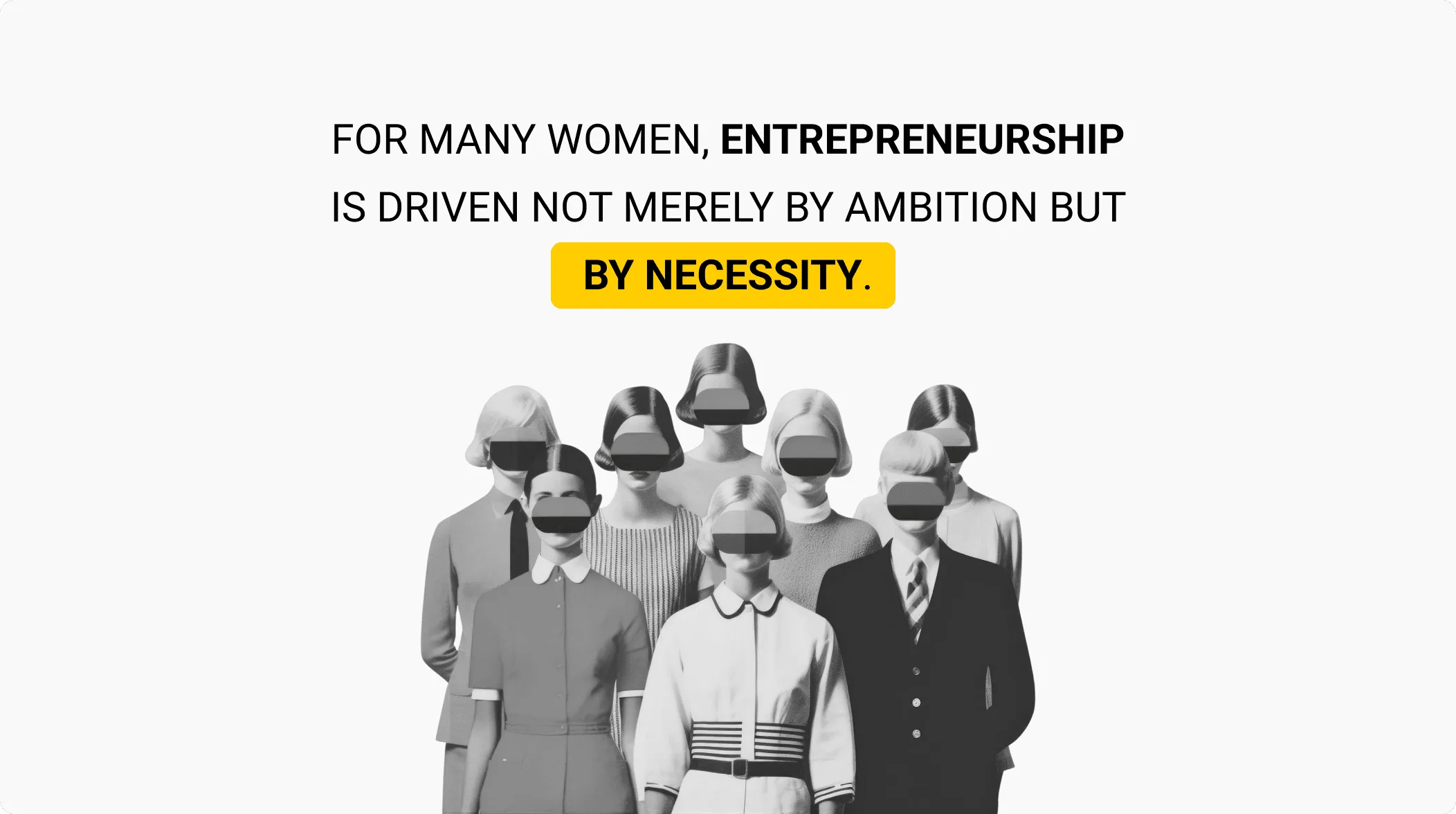
But this is not a matter of mere preference; it is a reflection of structural realities. Many women have turned to entrepreneurship because large corporations are inflexible in terms of childcare responsibilities or don't afford them opportunities for advancement.
2. The Support Gap Persists
Indeed, accessing professional business-support resources presents challenges for both men and women, yet research suggests that women make less use than men of external advisors, including accountants and consultants. This differential in support use compounds the other disadvantages facing women entrepreneurs.
3. Preparation vs. Action
Research indicates that women entrepreneurs often invest relatively more in training, skill-development, and preparation before launch, while men are more likely to shift earlier to customer-acquisition or business-development activities. These differing emphases may reflect confidence gaps or strategic differences in approach.
4. The Confidence Factor
Recent research highlights a persistent confidence gap between male and female entrepreneurs. Men generally express higher confidence in their likelihood of business success and future growth, while women often report lower self-assessed confidence despite comparable competence and outcomes. Whether this stems from impostor syndrome, realistic awareness of systemic barriers, or long-standing socialization patterns, it continues to shape how women approach entrepreneurship and risk-taking..
5. Experience and Solo Entrepreneurship
Women often launch ventures with less prior founding experience than men and are more prone to starting businesses without co-founders. Combined with narrower access to networks and resources, this may help explain why women more frequently express a stronger need for training and external validation.
The data shows that women differ in their approach to entrepreneurship, not because of inherent traits, but because they operate under different conditions, face different barriers, and draw on different support systems. Recognizing these motivational and contextual differences is critical for designing support systems that genuinely meet women's needs.
Implications for Entrepreneurs and Practitioners
Understanding the barriers is only the first step. Real progress requires action from multiple stakeholders, entrepreneurs themselves, investors, mentors, and policymakers. Here's what each group can do to create meaningful change.

If you are considering starting or expanding a business, these practical steps can put you on solid ground:
- Build your network with intention: Join communities of women founders, such as Female Founders Alliance, SheEO, or Chief. Go to events in your industry, join online groups, and ask people for informational interviews.
- Seek mentorship early: Leverage online mentorship platforms to get in touch with seasoned entrepreneurs. Find mentors who have overcome the same obstacles you now face, especially in funding and scaling.
- Diversify your sources of funding: Avoid just traditional VC. Consider crowdfunding platforms like Kickstarter and Indiegogo, angel investors, gender-lens funds, small business grants, and revenue-based financing options.
- Invest in digital skills: Upskill in areas like digital marketing, data analytics, AI tools, and e-commerce platforms. Free or low-cost resources include Google Digital Garage, Coursera, and LinkedIn Learning.
- Address the confidence gap: head-on through documentation of achievements, relentless practice of your pitch, and surrounding yourself with people who believe in your vision. Confidence comes from both preparation and community.
For Investors and Mentors
If you're in a position to support entrepreneurs, here's how to promote equity:
- Check your biases: Are you asking women founders prevention-focused questions and asking men promotion-focused questions? Are you pattern-matching based on who "looks like" past successful founders? Awareness is the first step to change.
- Diversify deal flow: by proactively sourcing opportunities from women-led ventures, partnering with female-focused accelerators, and attending pitch events that place a high value on diversity.
- Provide equitable mentorship: This means offering strategic guidance, making introductions, and promoting women founders in rooms when they are not present. Mentorship without access is incomplete.
- Support gender-lens investing: by deploying capital into funds specifically focused on women entrepreneurs, or create specific investment theses focused on gender equity.
- Outcome measurement and tracking: Set diversity goals for your portfolio and hold yourself accountable to them.
For Policymakers and Ecosystem Builders
Systemic change requires structural intervention. Here's what works:
- Design inclusive funding programs: Grant programs should be developed that target specifically women entrepreneurs, particularly women of color and immigrant women, along with low-interest loans and tax incentives.
- Support caregiving infrastructure: Fund affordable child care, provide parental leave for entrepreneurs, and create co-working spaces with in-house child care. Entrepreneurship shouldn't require a choice between business and family.
- Invest in entrepreneurship education: Introduce entrepreneurship curricula in schools that normalize women's leadership; fund programs offering digital skills training and business development support.
- Build regional support ecosystems: through local accelerators, incubators, and mentorship networks that connect women entrepreneurs with resources, capital, and each other.
- Mandate transparency: Require that funding allocation be reported publicly by gender. Where there's visibility, accountability is created. Simplify business registration, reduce bureaucratic hurdles, and ensure equal access to government contracts and procurement opportunities.
Change happens when people act, and systems adjust to accommodate them. Whether you're an entrepreneur fighting for your vision, an investor allocating capital, or a policymaker shaping infrastructure, it all comes down to what you decide. The question isn't whether gender matters in entrepreneurship; it's what you are going to do about it.
Is the Gender Gap in Entrepreneurship Closing?
Quick answer: There is progress, but it's painfully slow. On average for OECD countries, the women's employment rate increased, from Q1 2024 to Q1 2025, by about 0.32 percentage points more than that of men, while the gender gap in the participation rate decreased by 0.3 percentage points. This shows continued incremental progress, but it is frustratingly slow.
The Numbers Tell a Mixed Story
The global female start-up rate reached 10.4 percent in 2024 compared to 6.1 percent at the beginning of the 2000s. It is indeed an improvement, almost doubled within two decades. Over twice the number of women started a new venture in such countries as France, the Netherlands, and Hungary, with the highest rates recorded in LatAm, the Caribbean, and low-income countries.

But the funding landscape remains grim: of the $289 billion venture capital invested globally in 2024, just 2.3% went to female-only founding teams ($6.7 billion), while 83.6% went to all-male founding teams ($241.9 billion). These figures have barely budged in three decades, which means that while more women are starting businesses, access to capital remains severely constrained.
Where Progress Is Happening
The real rate of development is sharply varied in the regions and industries. Surprisingly, during the last few years, however, Nordic nations like Sweden, Denmark, and Norway not only underperformed average rates of female entrepreneurship compared to the OECD but also were ranked below 5th place; in 2023, Nordic nations like Slovenia, Lithuania, and Greece are being ranked last. Perturbingly, this upsets suggestions of gender equality as entrepreneurial equality. The involvement of women in entrepreneurship in Latin America and the Caribbean is also high, unlike in most developed economies.
In the U.S., women started nearly half (49%) of all new businesses in 2024-a dramatic increase from 29% in 2019, up 69%, which also marks the highest share on record in recent history. This is a clear indication that women are not just taking part but reshaping entrepreneurship. In angel investing, more than 30% of today's funded companies have women on their rosters, compared with 3% twenty years ago, marking large strides in early-stage funding, as venture capital remains out of balance.
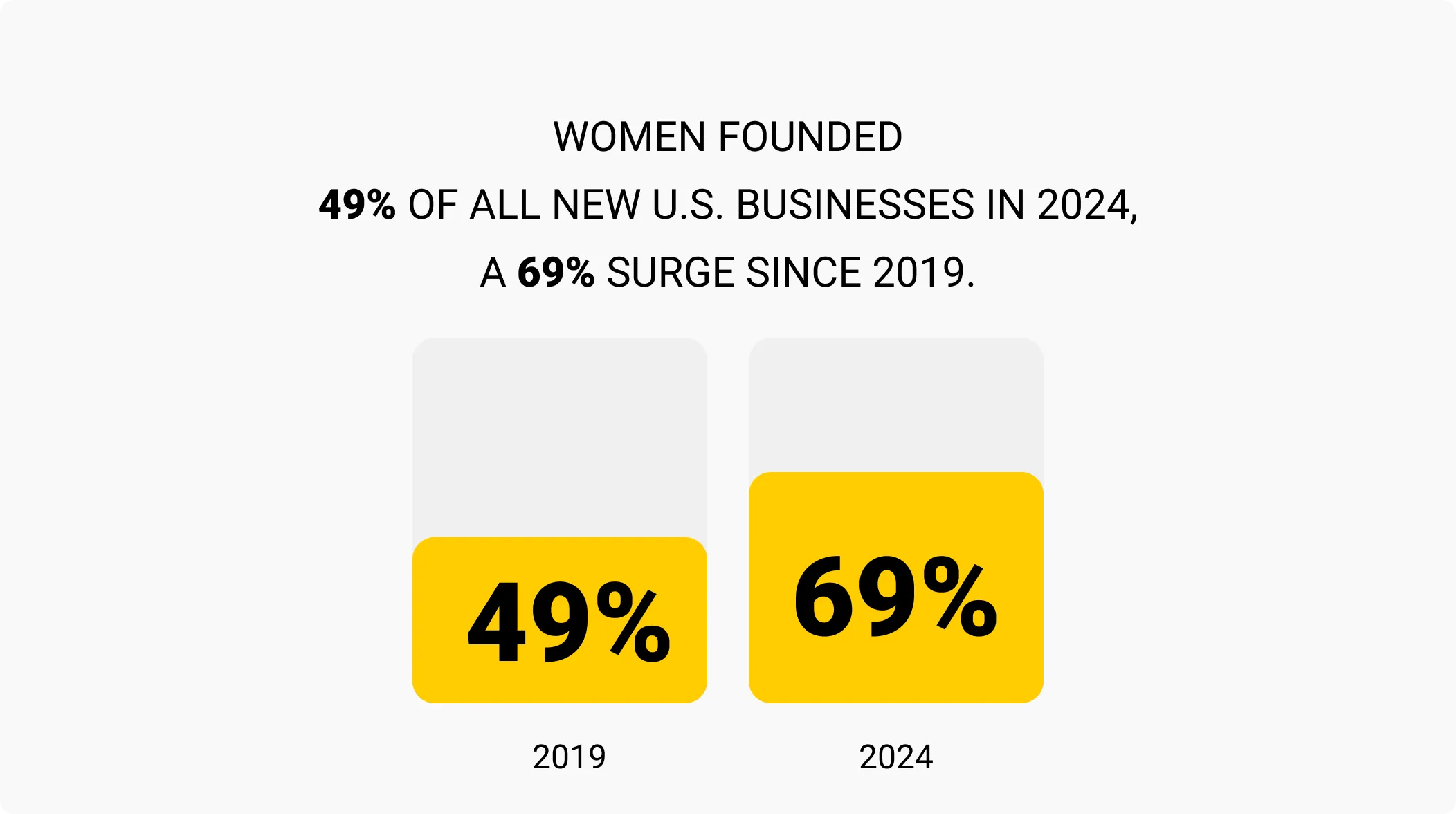
Why Structural Barriers Still Slow Change
A variety of factors have continued to affect the gender gap in entrepreneurship: social views about women in the workplace, different motivations and goals, and greater obstacles to enterprise development.
- Access to capital: Female founders receive roughly a quarter of the funding they seek, while their male peers receive half on average. This is something that compounds over successive rounds of funding.
- Investor composition: Women hold about 15.4% of partner- or decision-making roles at VC firms as of early 2025, and VC firms with at least one female partner are 2.3 times more likely to invest in female founders.
- Education and digital access: In South Asia, 60 percent of men have at least some secondary education, compared to 40 percent of women. About 327 million fewer women than men have smartphones and can access mobile internet worldwide.
- Social norms: Legal barriers in many countries prohibit women from starting and running businesses as men can.
Women's entrepreneurship policy initiatives are often fragile, time-limited, small-scale, and not sufficiently underpinned by a genuine vision and framework. Policymakers routinely encourage and support women's entrepreneurship through specific policies and programs, including promotion of female entrepreneurs as role models, entrepreneurial training, coaching and mentorship, and specialized finance programs.
To better support growth-oriented female businesses, many countries are implementing new policies, such as dedicated incubators/accelerators and reliable risk capital infrastructure.
According to the World Economic Forum's Global Gender Gap Report 2025, it will take 123 years to reach full gender parity at current rates of progress. The failure to close this gap has real consequences: closing gender gaps in entrepreneurship could add a 6-12% boost in GDP growth across OECD countries.
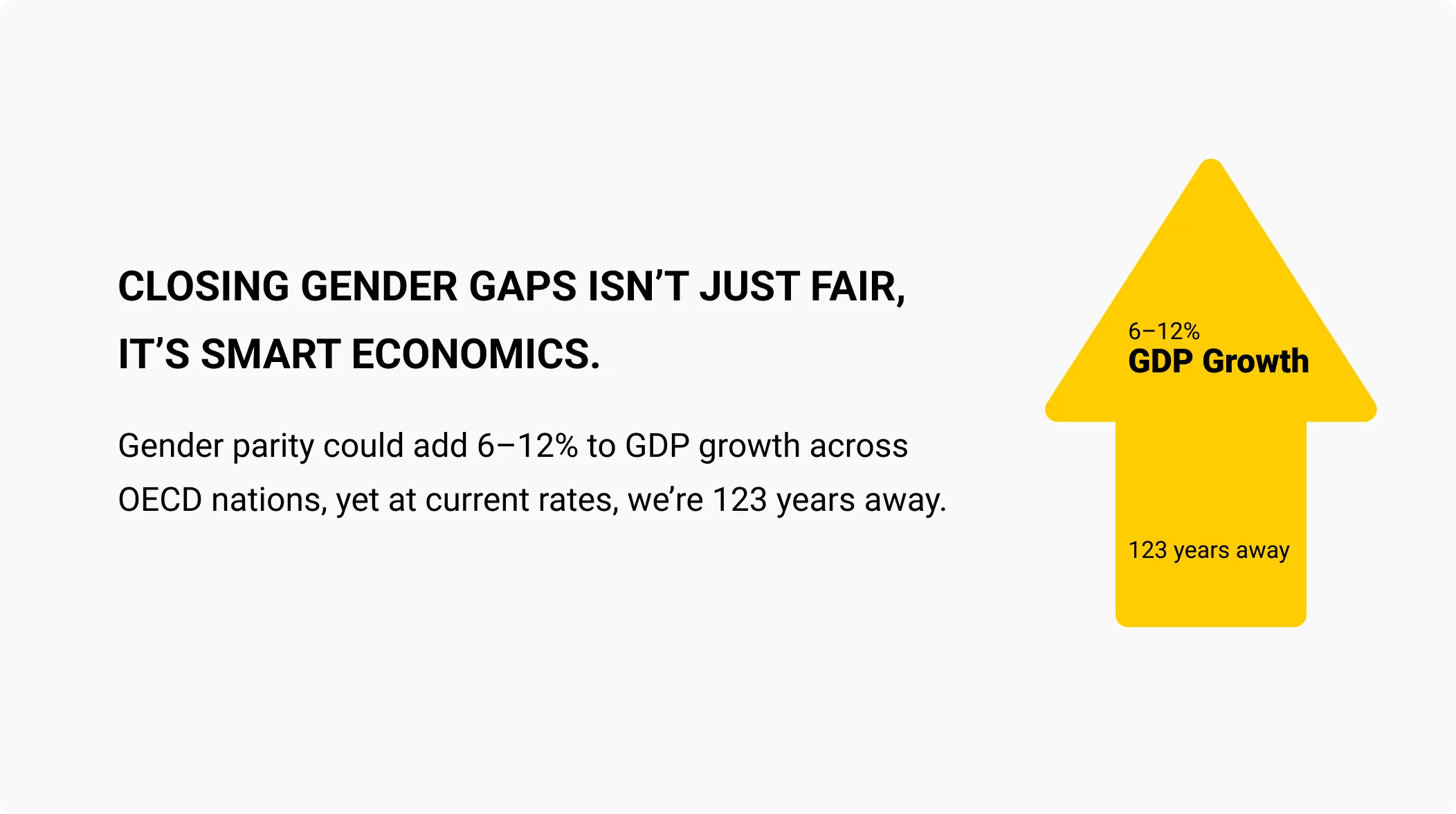
Outlook: Closing the Gap by 2030 and Beyond
The UN's Sustainable Development Goal calls to achieve gender equality by 2030, but at our current rates, we will not have economic gender parity for more than a century. Yet this doesn't have to be our reality.
What If We Accelerate?
The Gender Parity Accelerators of the World Economic Forum have supported more than 1 million women to date and mobilized more than $24 million of resources to address systemic barriers. This shows that targeted intervention works. If the gender gap in entrepreneurship were halved by 2030, the resulting economic impact would be transformative: increased GDP growth, more innovation, stronger job creation, and greater economic resilience around the world.
Recent Global Commitments
Momentum is building. The G20 has pledged to close the labor force participation gap between women and men, and UN Women is still pushing towards policy changes regarding access to finance, digital access, and legal safeguards for women entrepreneurs. World Economic Forum accelerators have driven reforms in childcare and parental leave, pay equity, and other policies while engaging more than 1,500 private sector partners in promoting workplace inclusion.
Steep but not impossible, the road to 2030 requires orchestrated action by governments, investors, and the private sector to shrink decades into years. No longer does the question remain about whether or not gender parity in entrepreneurship is achievable. Rather, it's one of whether we are serious enough about making this issue a priority with the urgency that it needs.
The Path Forward: What Happens Next?
We can't wait another 123 years for gender equality in entrepreneurship. The question isn't whether women can build successful businesses-they're already proving they can. The question is: will we act fast enough to matter?
Progress is real, but slow. More women are founding companies, yet the systemic barriers persist. We're leaving trillions in economic potential and millions of women's ambitions on the table.
Gender equality in entrepreneurship isn't just right; it's economically necessary. We move the clock forward one decision, one investment, one policy at a time.
Are you ready to be part of this movement?
Explore more insights on entrepreneurship at AI bees.
FAQs on Gender in Entrepreneurship
1. What is gender in entrepreneurship?
Gender in entrepreneurship, therefore, refers to how men and women differently engage in efforts of starting, maintaining, and developing a business. It examines distinct opportunities and challenges, sometimes leading to unique outcomes because of social roles, expectations, and economic access related to gender. In 2026, gender in entrepreneurship also points toward increasing women founders' exposure to tech, digital, and sustainability.
2. What are the main gender barriers to entrepreneurship?
Those barriers include a lack of access to funding, networking, and mentorship opportunities; lower levels of confidence; and unpaid caregiving responsibilities. Women entrepreneurs are also held back by systemic bias in venture capital and lending systems, along with cultural norms that discourage risk-taking or leadership roles for women.
3. What is the gender gap in entrepreneurship?
The entrepreneurial gender gap is an important measure in terms of the difference between men and women with regard to business ownership, access to capital, and growth opportunities. Despite improvements, about 2-3% of venture capital funding globally goes to women-owned startups, with women still a minority in high-growth segments such as tech and AI, in 2024-2025. Closing this gap could add as much as 12% to global GDP across OECD countries.
4. What are the four measures of gender equity in entrepreneurship?
The four measures of gender equity commonly applied to entrepreneurship are:
1. Economic participation and opportunity: equal access to funding, markets, and jobs.
2. Educational attainment: equal access to entrepreneurship and digital skills training.
3. Political Empowerment: Representation of women in policy-making and leadership positions.
4. Health and survival: Broader social and demographic indicators influencing women's ability to engage in business.
Combined, the above indicators reflect whether entrepreneurship ecosystems are equitable and inclusive.
5. How can we close the gender gap in entrepreneurship by 2030?
Closing the gender gap in entrepreneurship will take concerted action: increasing women founders' access to funding, building business networks more inclusively, integrating entrepreneurship education from earlier stages, and bringing in more gender-lens investing. Policies that support childcare, parental leave, and flexible work can make entrepreneurship accessible to women. At current rates, the world may take over a century to reach full parity-but coordinated global action could drastically shorten that timeline.
Make Loss Impossible
with Performance-Based Marketing

Personalized Campaigns with
Precisely Selected Prospects
.svg)
Analysis From Your Dedicated
Account Manager

with a Team of Growth Hackers
we Develop your Tailor-Made Strategy

.svg)











%201.svg)
.svg)





.webp)